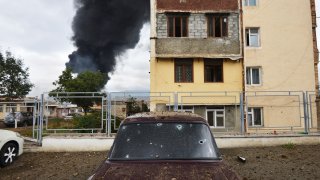
The fighting between Armenian and Azerbaijani forces continued on Sunday over the separatist territory of Nagorno-Karabakh, with Azerbaijan’s second-largest city coming under attack and Azerbaijan claiming to have seized a town and several villages.
The clashes erupted on Sept. 27 and have killed dozens, marking the biggest escalation in the decades-old conflict over the region, which lies within Azerbaijan but is controlled by local ethnic Armenian forces backed by Armenia.
Azerbaijani President Ilkham Aliyev tweeted on Sunday that the country’s troops “liberated from occupation the city of Jabrayil and several surrounding villages.” Nagorno-Karabakh’s officials rejected the claim as untrue, saying the territory’s army “is controlling the situation in all directions.”
Azerbaijani officials said earlier Sunday that Armenian forces attacked Ganja, the country’s second-largest city. Hikmet Hajiyev, Aliyev's aide to the Azerbaijani president, tweeted a video depicting damaged buildings, and called it the result of “Armenia’s massive missile attacks against dense residential areas” in Ganja.
It wasn’t immediately possible to verify the authenticity of the video. Hajiyev said in another tweet that attacks on Ganja and other areas in Azerbaijan were launched “from territory of Armenia.”
Armenia’s Defense Ministry said that “no fire of any kind is being opened from the territory of Armenia in Azerbaijan’s direction.” But Nagorno-Karabakh’s leader, Arayik Harutyunyan, said on Facebook that he ordered “rocket attacks to neutralize military objects” in Ganja, but later told his forces to stop firing to avoid civilian casualties.
Azerbaijani officials denied that any military objects had been hit, but said the attack caused damage to civilian infrastructure. One civilian has been killed, and 32 others sustained injuries, authorities said.
Ganja, home to several hundred thousand residents, is located roughly 100 kilometers (about 60 miles) north of Stepanakert, Nagorno-Karabakh’s capital.
“Opening fire on the territory of Azerbaijan from the territory of Armenia is clearly provocative and expands the zone of hostilities,” Azerbaijani Defense Minister Zakir Hasanov said in a statement Sunday.
As the fighting resumed Sunday morning, Armenian officials accused Azerbaijan of carrying out strikes on Stepanakert and targeting the civilian population there. Nagorno-Karabakh’s leader Harutyunyan said that in response, his forces would target “military facilities permanently located in major cities of Azerbaijan.”
In a statement issued later on Sunday, Azerbaijan’s Defense Ministry rejected accusations of targeting civilians and civilian infrastructure.
Nagorno-Karabakh officials have said nearly 200 servicemen on their side have died in the clashes so far. Azerbaijani authorities haven’t given details on their military casualties, but said 24 civilians were killed and 111 others were wounded.
Nagorno-Karabakh was a designated autonomous region within Azerbaijan during the Soviet era. It claimed independence from Azerbaijan in 1991, about three months before the Soviet Union’s collapse. A full-scale war that broke out in 1992 killed an estimated 30,000 people.
By the time the war ended in 1994, Armenian forces not only held Nagorno-Karabakh itself but substantial areas outside the territory’s formal borders, including Jabrayil, the town Azerbaijan claimed to have taken on Sunday.
The claim sparked hope among Azerbaijanis who fled Jabrayil in the 1990s and have since wanted to return to their hometown.
“The news about liberation of Jabrayil is the happiest and the most desired news for me and my family,” Zulfiya Amiraslanova, who said she and her family were forced to leave Jabrayil in 1993 and are now living in the capital Baku, told The Associated Press.
“We have a comfortable life here, but me and my entire family, (my) relatives dream about returning to our hometown,” 40-year-old Amiraslanova said.
This week’s fighting has prompted calls for a cease-fire from around the world. On Thursday, leaders of Russia, France and the United States — co-chairs of the so-called Minsk Group, which was set up by the Organization for Security and Cooperation in Europe in 1992 to resolve the conflict — issued a joint statement calling for an immediate cease-fire and “resuming substantive negotiations ... under the auspices of the OSCE Minsk Group co-chairs.”
Azerbaijani President Aliyev said that Armenia’s withdrawal from Nagorno-Karabakh is the sole condition to end the fighting.
Armenian officials allege that Turkey is involved in the conflict and is sending fighters from Syria to the region. Armenian Prime Minister Nikol Pashinian said earlier this week that “a cease-fire can be established only if Turkey is removed from the South Caucasus.”
Ankara has denied sending arms or foreign fighters, while publicly siding with Azerbaijan in the dispute.
On Sunday, Turkey’s Foreign Ministry condemned the attack on Ganja, saying it was proof of Armenia’s disregard for the law. Ankara accused Armenia of attacking civilian residential areas, and claimed that Armenia could commit crimes against humanity.
“Armenia is the biggest barrier to peace and stability in the region,” the ministry said.
In Istanbul, hundreds of Azeri Turks gathered to support Azerbaijan on Sunday, waving Turkish and Azerbaijani flags and singing their national anthems.
Associated Press writers Daria Litvinova in Moscow, Aven Demourian in Yerevan, Armenia, and Zeynep Bilginsoy in Istanbul, Turkey, contributed to this report.

